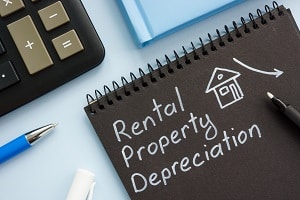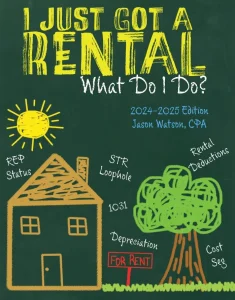
Business Advisory Services
Everything you need to help you launch your new business entity from business entity selection to multiple-entity business structures.
Hey - Our site just had a makeover and we are sorting through the hiccups!
Hey - Our site just had a makeover and we are sorting through the hiccups!

Everything you need to help you launch your new business entity from business entity selection to multiple-entity business structures.

Designed for rental property owners where WCG CPAs & Advisors supports you as your real estate CPA.

Everything you need from tax return preparation for your small business to your rental to your corporation is here.

Table Of Contents


Sometimes two parts of the tax code meet, fall in love, and create something truly powerful. When a rental property, a short average guest stay, material participation, a cost segregation report, and bonus depreciation all come together like a Beatles song, you get what we call a tax marriage—a relationship so good it can even offset W-2 income.
This is the modern day love story of the short-term rental (STR).
Every great story starts with a connection. Here, our hero is a humble rental property. Under normal circumstances, rental income and losses are passive under IRC Section 469, which means you can’t use those losses to reduce your high W-2 wages. They can only offset other passive income unless your modified adjusted gross income (MAGI) is under $150,000.
But enter the twist: average guest stay.
If your average rental period is seven days or less, the IRS no longer sees this as a traditional rental. It’s treated more like an active trade or business—similar to running a boutique hotel. That’s an important distinction because it opens the door to non-passive treatment if you materially participate.
Translation? This is how your rental property earns the right to sit at the same table as your W-2 income. “Pass the wine, please.”
Like any healthy marriage, this relationship only works if you show up. The IRS requires that you materially participate—meaning you’re involved on a regular, continuous, and substantial basis.
There are seven tests for material participation, but for most short-term rental owners, the simplest is:
In practice, that means being hands-on—handling bookings, managing cleaners, responding to guests, and keeping the operation running smoothly. Keep a time log, calendar, or even a spreadsheet. Material participation time logs and documentation is your prenup here.
Sidebar: The other two common tests are 500 hours and substantially all hours are your hours.
Once you meet the average guest stay and material participation tests, your STR is no longer passive. The losses it generates can flow directly against your W-2 income. That’s when sparks start to fly. Oh, don’t roll your eyes- we’re having some fun here!
Now that the relationship is official, it’s time to maximize the rental property tax benefits. Enter the cost segregation study—a powerful tax engineering tool that identifies which parts of your rental property depreciate faster. Instead of treating the whole building as a 39-year asset, a cost seg study breaks out components like:
These can often be depreciated over 5, 7, or 15 years instead. It’s like discovering your new life partner has a hidden trust fund. A big one.
With cost segregation, you accelerate tax deductions into the early years of ownership, freeing up large paper losses today instead of small ones spread over decades.
And then comes the magic—the honeymoon phase. Bonus depreciation allows you to take immediate deductions on certain assets identified in the cost segregation study.
For qualifying assets placed in service after January 19, 2025, bonus depreciation is back to 100% under IRC Section 168(k) thanks to the One Big Beautiful Bill Act. That means you can fully deduct the cost of eligible 5-, 7-, and 15-year property identified in your cost segregation study in the first year. Yeah baby!
Here’s what that looks like in numbers: suppose your cost seg identifies $150,000 in short-life property on a $1 million purchase where $750,000 is associated with the building. With 100% bonus depreciation, that’s a $150,000 tax deduction in year one. If you’re materially participating, that deduction can offset your W-2 wages.
That’s the heart of this tax marriage: a short-term rental activity that qualifies as a business, generating legitimate non-passive losses that can directly reduce earned income.
Let’s talk about who this tax marriage benefits most. Yeah, we kinda gave it away just a bit ago. If you’re a high-income W-2 earner—say, a physician, engineer, IT sales rep, executive, or a zillion other professions—you already know how brutal ordinary income tax rates can be. Unlike business owners, there’s no easy way to create tax deductions. Well, perhaps create tax deductions is a bit much- having said that, business owners do enjoy a bit more flexibility in leveraging the tax code.
That’s where the STR comes in as your perfect partner without having to quit your day job just to open some tax deduction doors.
If they actively manage guests, cleaners, and bookings, that $150,000 example above with a 37% marginal rate creates a $55,500 in tax savings (with 100% bonus depreciation, about 18% to 22% of the building portion will historically be deducted with bonus depreciation on a DIY cost seg). All while owning a rental property that guests pay to use and help you pay for an income-producing asset as you build wealth. Tax savings now. Wealth building later. Win win!
Like any relationship, this one requires maintenance. Sorry guys! If you hand the short-term rental property off to a full-service management company and rarely lift a finger, you’ll likely lose material participation status. The IRS has caught on to cookie-cutter “STR tax shelter” setups, so make sure yours passes the smell test.
Keep documentation, track your hours with REPSLog, and ensure your rental activity genuinely qualifies. Also, remember that when you sell (or reduce business use to or below 50% when using Section 179), depreciation recapture rules can trigger income later. Still, that’s usually a small trade-off compared to the upfront savings.

Do you use 100% bonus depreciation or Section 179? What are the problems with bonus depreciation? Any pitfalls with Section 179? What property is eligible for accelerated depreciation?
A short-term rental, properly structured and managed, is one of the few ways a W-2 earner can meaningfully reduce taxes. The key ingredients are:
Put them together, and you have a true tax marriage—one that can turn real estate into both a cash-flow and tax-saving machine.
At WCG CPAs & Advisors, we help rental property owners and real estate investors design this relationship the right way—analyzing material participation, coordinating cost seg studies, and ensuring compliance with IRS standards. Whether you’re planning your first short-term rental or adding another property to your portfolio, we’ll help you keep this tax marriage strong for years to come.
 I just got a rental, what do I do? Purchasing a rental property is certainly challenging, but operating one to build wealth and find tax efficiency is equally challenging. This is our second book. Our first book, Taxpayer’s Comprehensive Guide to LLCs and S Corps, was first published in 2014 and was well-received by small business owners and tax professionals, so we thought a book on rental properties and real estate investments would be equally helpful. So, here we are with our second iteration, or the 2025 edition. We update it frequently throughout the year (last update was October 6, 2025).
I just got a rental, what do I do? Purchasing a rental property is certainly challenging, but operating one to build wealth and find tax efficiency is equally challenging. This is our second book. Our first book, Taxpayer’s Comprehensive Guide to LLCs and S Corps, was first published in 2014 and was well-received by small business owners and tax professionals, so we thought a book on rental properties and real estate investments would be equally helpful. So, here we are with our second iteration, or the 2025 edition. We update it frequently throughout the year (last update was October 6, 2025).
Our rental property book starts with entity structures and moves into asset management such as acquisition, cost segregation, rental safe harbors, repairs versus improvements, accelerated depreciation, partial asset disposition, and 1031 like-kind exchange. From there we discuss various rental considerations like passive activity losses, short-term rental loophole, real estate professional status, and material participation including what time counts, and what time doesn’t count.
Finally, the good stuff! Rental property tax deductions such as travel, meals, automobiles, interest tracing, home office and common expenses. Fun!
It is available in paperback for $19.95 from Amazon and as an eBook for Kindle for 15.95. Our book is also available for purchase as a PDF from ClickBank for $12.95.
WCG has a team of real estate CPAs ready to assist you with your rental property and real estate investments. Very few tax professionals and CPA firms specialize in real estate to provide you solid consultation, tax planning including tax reduction strategies, and tax return preparation. We are experts in-
This book is written with the general rental property in mind. Too many resources tell you the general rule but don’t bother to back it up with Internal Revenue Code, Treasury Regulations and Tax Court cases. Our book lays it all out, explains the madness, adds some humor and various conundrums. Example? Water heaters and hot tubs- crazy stuff to consider.
Enjoy! And please send us all comments, hang-ups and static. This book is as much yours as it is ours, except the tiny royalty part- that’s ours. Stop by and we’ll buy you a beer with the pennies.
If you buy our 480-page book and think that we didn’t help you understand rental property tax laws, let us know. We never want you to feel like you wasted your money. If you are ready to add some insightful reading into your day, click on one of the preferred formats. Amazon is processed by Amazon, and the PDF is safely processed by ClickBank who will email you the PDF as an attachment.
 |  |  |
| $19.95 | $15.95 | $12.95 |

Want to talk to us about tax return preparation, tax planning and strategy, and all the other things that go with it? We are eager to assist! The button below takes you to our Getting Started webpage, but if you want to talk first, please give us a call at 719-387-9800 or schedule an discovery meeting.
Jason Watson, CPA is a Partner and the CEO of WCG CPAs & Advisors, a boutique consultation and tax preparation CPA firm serving clients nationwide with 7 partners and over 90 tax and accounting professionals specializing in small business owners and real estate investors located in Colorado Springs.
He is the author of Taxpayer’s Comprehensive Guide on LLC’s and S Corps and I Just Got a Rental, What Do I Do? which are available online and from mostly average retailers.
Table Of Contents

Tax planning season is here! Let's schedule a time to review tax reduction strategies and generate a mock tax return.

Tired of maintaining your own books? Seems like a chore to offload?
Did you have questions about how this works? When cost segregation makes sense and when it doesn't? Curious about how to deduct that kitchen renovation in full? Have a specific question about real estate and need a tax expert?
The tax advisors, business consultants and rental property experts at WCG CPAs & Advisors are not salespeople; we are not putting lipstick on a pig expecting you to love it. Our job remains being professionally detached, giving you information and letting you decide within our ethical guidelines and your risk profiles.
We see far too many crazy schemes and half-baked ideas from attorneys and wealth managers. In some cases, they are good ideas. In most cases, all the entities, layering and mixed ownership is only the illusion of precision. As Chris Rock says, just because you can drive your car with your feet doesn’t make it a good idea. In other words, let’s not automatically convert “you can” into “you must.”
Let’s chat so you can be smart about it.
We typically schedule a 20-minute complimentary quick chat with one of our Partners or our amazing Senior Tax Professionals to determine if we are a good fit for each other, and how an engagement with our team looks. Tax returns only? Business advisory? Tax strategy and planning? Rental property support?

Everything you need to help you launch your new business entity from business entity selection to multiple-entity business structures.

Designed for rental property owners where WCG CPAs & Advisors supports you as your real estate CPA.

Everything you need from tax return preparation for your small business to your rental to your corporation is here.


